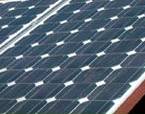Researchers from Yale University say improvements they have made to solar cell efficiency levels could result in less expensive, more efficient solar power systems and encourage broader use of clean energy technology.
The team, made up of engineers and physicists, have developed a way of guiding and channelling electrons within hybrid organic-inorganic photovoltaic systems, maximising the amount of light converted to electricity.
Cheap to produce, non-toxic and recyclable, organic solar is a rapidly-growing field, but with light-to-energy efficiencies of around 4-6 percent, the technology lags behind traditional silicon-based PV.
According to the Yale team, much of the light absorbed by hybrid organic-inorganic solar devices is wasted due to the poorly ordered structure of the active materials used in the organic solar material, resulting in a convoluted path for the flow of electrons.
The team used aligned arrays of polymer-coated nanowires to re-configure these natural pathways within the active material of the organic solar cell, allowing electrons to be more efficiently channelled throughout the system. A magnetic field aligns the nanowires and creates more direct pathways for charge transport in the device.
“The key here is controlling the structure of the system on multiple levels, or length scales, and doing it in a manner that is conducive to fabrication of devices over large areas,” said Chinedum O. Osuji, a Yale engineering professor and a principal investigator behind the research, recently published online in the journal Advanced Materials.
According to Osuji, the next step will be taking the technology out of the lab and applying it to rooptop solar power.
“We are currently working on building and systematically testing actual solar cells using these highly ordered materials.”
Source







































